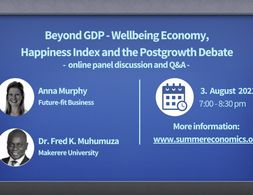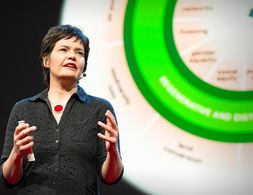✕
545 results
As the Covid-19 fueled economic downturn begins to intensify this winter, an extended study of the Italian cooperative sector’s historical resilience in times of crisis can serve as a learning experience for other countries seeking to create policies that foster more stable economies, with job security, care for marginalized communities and adequate counter-cyclical policies. Particularly, the Italian cooperative sector’s contributions to three aspects should be noted in closing. Firstly, the innovative phenomenon of cooperative enterprises has contributed to social inclusion of immigrant communities, the activation of youth, the unemployed and people with disabilities, a true compensation for both a market and state failure. Secondly, they have contributed to a reduction in income and wealth inequalities at a time when the issue of inequality is of global significance. Thirdly, the Italian cooperative movement has helped local communities revitalize in the face of demographic shifts and rendered them more resilient to the ravages of globalization. Each of these in their own right is a remarkable achievement.
This essay draws on several analyses on the gender impact of the recession and of austerity policies, in which authors acknowledge a threat to women’s labour market integration and a potential backlash to traditional gender labour structures. We contribute to that literature by asking whether recession and austerity convey a gender effect on educational attainment. Our aim in this essay is to portray the likely effects of austerity measures on gender equality with a focus on women’s participation in tertiary education and to hypothesize the implications of these scenarios for labour market effects, to be tested in future empirical research.
This chapter discusses the role of gender in economic relations, processes, and outcomes. Gender differences in economic outcomes such as labor force participation and wages have received growing attention from economists in the last several decades – a positive and much needed development in economic thinking.
Exploring Economics, an open-access e-learning platform, giving you the opportunity to discover & study a variety of economic theories, topics, and methods.
This episode of the Future Histories Podcast featuring Moira Weigel sets the development of digital capitalism and the right-ward shift in politics and society in relation to one another. It provides a masterful combination of ideology critique and polit-economic analysis grounded in comprehensive knowledge of the digital economy.
Prof. Yanis Varoufakis talks in this introductory lecture about the future of our economy and the current state of economics with special regard to pluralism in economics.
The Routledge Handbook of Feminist Economics presents a comprehensive overview of the contributions of feminist economics to the discipline of economics and beyond. Each chapter situates the topic within the history of the field, reflects upon current debates, and looks forward to identify cutting-edge research. Consistent with feminist economics' goal of strong objectivity, this Handbook compiles contributions from different traditions in feminist economics (including but not limited to Marxian political economy, institutionalist economics, ecological economics and neoclassical economics) and from different disciplines (such as economics, philosophy and political science). The Handbook delineates the social provisioning methodology and highlights its insights for the development of feminist economics. The contributors are a diverse mix of established and rising scholars of feminist economics from around the globe who skilfully frame the current state and future direction of feminist economic scholarship. This carefully crafted volume will be an essential resource for researchers and instructors of feminist economics.
Economics has become a monolithic science, variously described as formalistic and autistic with neoclassical orthodoxy reigning supreme. So argue Dimitris Milonakis and Ben Fine in this new major work of critical recollection.
The documentary features a talk of the US-American writer and economic theorist Jeremy Rifkin summarising the main points of his 2011 book "The Third Industrial Revolution."
Homo sapiens is now evolving into post economy The New Economy must manage scarcity and affluence a dual problem that is not integrated into the main classical economic theories There will be an important shock between opulence described by the economist John Kenneth Galbraith in The Affluent Society and scarcity …
Mr Minsky long argued markets were crisis prone His moment has arrived The Wall Street Journal In his seminal work Minsky presents his groundbreaking financial theory of investment one that is startlingly relevant today He explains why the American economy has experienced periods of debilitating inflation rising unemployment and marked …
The Bank of England s introduction to money in the modern economy is composed by a video and a paper which work hand in hand In them money is presented as a form of debt issued by someone and spent as credit by someone else Furthermore the three main types …
Colonial Global Economy is a module of the Connected Sociologies Curriculum Project and examines the ongoing significance of colonial relations in the structure of the global economy It consists of 7 introductory lectures which range between 17 and 39 minutes of length In addition further readings resources and questions for …
What determines the status of women in different communities? What role is played by women’s labor (inside and outside of the home)? By cultural norms regarding sexuality and reproduction? By racial/ethnic identity? By religious traditions? After some brief theoretical grounding, this course will address these questions by examining the economic, political, social, and cultural histories of women in the various racial/ethnic groups that make up the US today.
In most economics classes we focus on the production and consumption of goods and services, but what happens to the product and its packaging after it’s consumed? Waste disposal is a crucial step in the production process and as the theme of this month’s World Environment Day is #BeatPlasticPollution, we use the example of plastic bottles.
As the global economic landscape evolves, demographics shift, inequality expands, climate change gets worse and technology continues to advance at breakneck speed, Gross Domestic Product (GDP) is struggling to stay relevant.
The main goal of this website is to make Economics less confusing. You can explore what the discipline of Economics is and could be. Learn about basic Economic terms and jargon.
In this Ted Talk, Oxford economist Kate Raworth argues that instead of prioritizing the growth of nations, the world should rather prioritize meeting the needs of all people living on the planet within ecological limits.
South Africa’s taxi industry was established by black people in the 1930s and has faced numerous challenges, including those posed by decades of apartheid laws. Covid-19 has highlighted contemporary challenges facing the industry and has also raised questions about how it can keep ‘driving forward’. This podcast explores questions such as what changes need to be made, and who can be the ‘drivers’ of such change.
Introduces four of the most influential economists you'll never read in a modern economics class - Marx, Veblen, Keynes, and Galbraith.
Croatia adopted the euro as its currency on 1 January 2023, becoming the 20th member state of the eurozone. In this teaching pack, students learn what it entails to join the eurozone and discuss what its effects might be. In this way, the case helps students connect theoretical insights about monetary unions with real world knowledge and economic developments in the news.
How can we shape urban development towards sustainable and prosperous futures This course will explore sustainable cities as engines for greening the economy We place cities in the context of sustainable urban transformation and climate change Sustainable urban transformation refers to structural transformation processes multi dimensional and radical change that …
Although sometimes used as synonyms, economic growth and economic development refer to different processes. While economic growth refers to an increase in real national income and output (i.e., GDP growth rate), economic development refers to an improvement in the quality of life and living standards (i.e., life expectancy).
Ernest Mandel, a heterodox Marxist economist, shows here how a political economist can analyse systems such as the Soviet Union.
In this podcast, Professor Darrick Hamilton critically discusses how current neoliberal economic models uphold a systemically racially unjust structure of economies.
Richard Werner touches on a number of topics in this Odd Lots Podcast episode. As one of the pioneers when it comes to money and credit creation, he gives interesting insights into his early research on this topic. He then explains what he calls the “Quantity Theory of Credit” and is an alternative to the "Quantity Theory of Money".
Ride hailing home sharing meal delivery and other forms of digitally powered task sharing are creating jobs and growth in Europe and significant policy challenges What should be the responsibilities of these new platforms how should workers be classified and how can insurers and others provide services to this new …
This video provides key insights into the functioning of Western sanctions imposed on Russia due to the current Ukrainian conflict.
An examination of women's changing economic roles. Includes an analysis of labour force participation, wage inequality, gender differences in education, intra-household distribution of resources, economics of reproduction, and how technological change affects women.
By the end of this course, students should understand the basic economic theories of the gender division of labor in the home and at the workplace, and theories of gender differences in compensation and workforce segregation.
Mainstream economics was founded on many strong assumptions. Institutions and politics were treated as irrelevant, government as exogenous, social norms as epiphenomena. As an initial gambit this was fine. But as the horizons of economic inquiry have broadened, these assumptions have becomehindrances rather than aids.
Diane Perrons and Sigrid Stagl combine feminist and critical environmental economics perspectives to develop a critique of the free market growth model and offer new ideas for a more sustainable gender equitable model of development in the interests of all.
We use cookies on our website. Click on Accept to help us to make Exploring Economics constantly better!





























